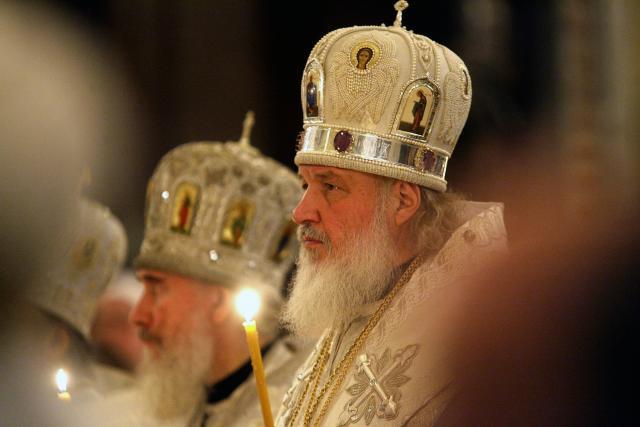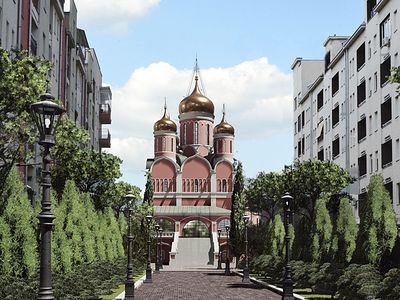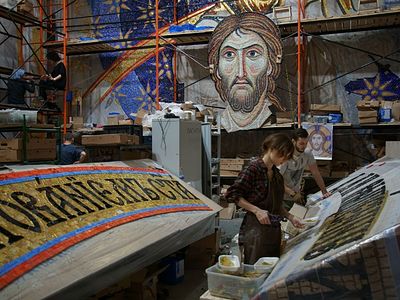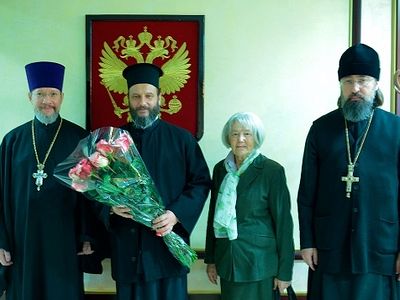Moscow, September 14, 2017
His Holiness Patriarch Kirill of Moscow and All Russia spoke recently in an interview about the warm filial relations between the Russia and Serbian peoples. “You know, an incredible feeling overwhelms a Russian when they come to Serbia. You don't feel you’re in a foreign country. On the contrary, you feel at home, surrounded by your brothers,” primate told the website Iskra in an exclusive interview, B92 reports.
“Our countries have so much in common. Above all, of course, there is our common faith, our common spiritual and moral values, our close cultures and close historical ties,” Pat. Kirill added. Emphasizing this ancient spiritual connection, Russia is planning to create a European pilgrimage route jointly with Serbia and Greece, Russian Deputy Culture Minister Alla Manilova stated in June 2016.
“I always think about Serbia with special feelings. I have visited your hospitable Serbian land several times, back when I was the chairman of the Church’s foreign relations department. The Lord has dignified me with visiting your beautiful country twice as patriarch,” Kirill said.
Pat. Kirill visited Serbia in November 2014 to consecrate the then-newly erected monument to Tsar Nicholas II. Another monument to the tsar was opened in Bosnia and Herzegovina in June 2014, timed to coincide with the centenary since the beginning of the World War I. When in July 1914 Austria-Hungary with the support of Germany started a war against Serbia, the Serbian successor to the Throne Prince Alexander Karađorđević appealed to the Russian Emperor Nicolas II, who assured him that “Russia will not remain indifferent to the destiny of Serbia.” Soon after that Russia launched a war against Germany in order to defend their brothers, the Serbian people. Yet another monument to Tsar Nicholas will be opened in Bosnia and Herzegovina later this month.
In the words of Holy Hierarch Nikolai (Velimirovic): “Our debt to Russia is great. A person could owe a debt to another person, a nation—to another nation. But the debt the Serbian people owe to Russia for its actions in 1914 is so great that it won’t be repaid in generations and centuries. This is a debt of love, when one dies saving one’s neighbor. There is no greater love than to lay down one's life for one's friends, said Christ. The Russian Tsar and Russian people, who went to war in order to defend Serbia, entered it unprepared, knowing full well that they are facing death. But the love the Russians have for their brothers did not retreat in the face of danger and was not afraid of death”.
The Orthodox faith, Slavic origins, and the history of Russian-Serb relations have their source in the earliest times of the Slavic Orthodox civilization, the patriarch continued.
“If we look back at history we can see to what degree, thanks to Divine providence, the fates of our two peoples have been intertwined,” the patriarch said. He also went on to highlight the fact that the Russian and Serbian peoples have stood together through various challenges throughout history:
“Russia supported Serbia during the First World War. And when the revolution happened in Russia and when belligerent people fighting against God came to power, Serbia, which was itself struggling with the consequences of the war, received a large number of refugees from Russia and accepted them as its own people.”
Likewise, in the years following the devastating revolution of 1917, Russia found necessary aid from Serbia. With the Bolshevik persecutions of the Church, a large number of clergy fled Russia, and formed the Supreme Ecclesiastical Authority which moved to the United Kingdom of Serbia, Croatia and Slovenia in 1921. In August of that year, the Council of Bishops of the Serbian Orthodox Church gave its blessing for the activity of this Russian ecclesiastical body. Patriarch Dimitrije of Serbia gave the refugee Russian bishops a part of his residence in Sremsky Karlovcy, where on November 21, 1921, the first All-Diaspora Russian Church Council of hierarchs, clergymen and laity convened, which laid down the foundation of the canonical status and fate of many Russian parishes abroad.
Pat. Kirill also stressed that the two nations today face new serious temptations.
“We Orthodox people, Serbs and Russians, are called upon to, as before, stand shoulder to shoulder in this struggle for our spiritual identity, for the preservation of the Orthodox civilization, defending God-given marriage as a union between a man and a woman, and the value of human life from conception until natural death, without succumbing to false temptations of external material prosperity and without getting seduced by false ideas about human freedom and happiness,” he said.






